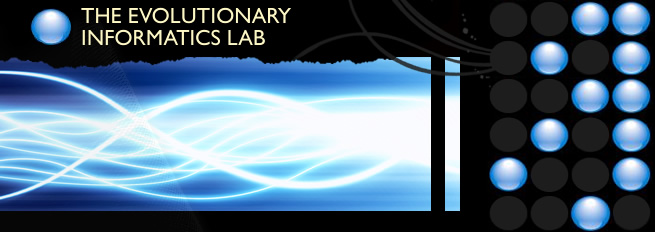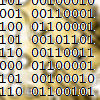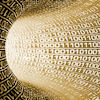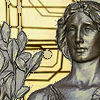The
honor of mathematics requires us to come up with a mathematical theory of evolution and either prove Darwin was wrong or right." Gregory Chaitin
Quote
For more recent videos, see In The News
Julian Charles- The Mind Renewed: "Introduction to Evolutionary Informatics" Dr. Robert J. Marks II
We are told that there are robust mathematical models that demonstrate the truth of Neo-Darwinian theory. But is that really so? We are joined by Dr. Robert J. Marks II, Distinguished Professor of Engineering at Baylor University, for a discussion on his newly-published book, Introduction to Evolutionary Informatics, co-authored with the mathematician and philosopher Dr. William A. Dembski and the research scientist and software engineer Dr. Winston Ewert. Drawing upon his and his colleagues' work on information theory, and their analyses of naturalistic evolutionary models, Dr. Marks argues that there are logical limits to what such evolutionary algorithms can accomplish and that none of the proposed models lives up to the claims made about it. Rather, each exhibits some form of "active information" unwittingly contributed by the "domain expertise" of its designers, thus serving to further the case for intelligent design in nature. Dr. Marks also addresses AI (artificial intelligence) and argues, contrary to many voices today, that computers will never rise to the heights of human consciousness and creativity. Dr. Marks's eponymous honours include the Zhao-Atlas-Marks (ZAM) time-frequency distribution in the field of signal processing, the Cheung–Marks theorem in Shannon sampling theory and the Papoulis-Marks-Cheung (PMC) approach in multidimensional sampling. He was instrumental in defining the field of computational intelligence, and with his colleagues developed the temporal convolutional neural network, widely used in deep learning. In 2013 he was listed among "The 50 Most Influential Scientists in the World Today" by TheBestSchools.org. A Christian since 1970, Marks is married with three children, three grandchildren, two dogs and a "stupid horse". (May 2017)
"AI and HYPE" on Jerry Newcombe's For God and Country hosting Robert J.Marks
Lately some computers have been beating human champions at chess, at Jeopardy, at Go. Is AI (Artificial Intelligence) potentially a threat to humankind? Entrepreneur and explorer Elon musk says that A.I. is humanity’s “biggest existentialist threat.” Bill gates notes, “I don’t understand why some people are not concerned” about A.I. One man who is not is Robert Marks, Ph.D., who is a professor at Baylor University and a senior fellow with the Discovery Institute. Dr. Marks appeared in the film by Ben Stein, EXPELLED. Dr. Robert Marks joins Jerry Newcombe on Vocal Point to discuss the potential threat of Artificial Intelligence. www.evoinfo.org
Janet Mefford Today on American Family Radio - "A.I. Hype & Limitations" with guest Robert J. Marks
The Remnant Road. "RAGING AGAINST THE MACHINES" with guest Robert J. Marks
Why Digital Cambrian Explosions Fizzle … Or Fake It : Introduction to Evolutionary Informatics
Winston Ewert and host Ray Bohlin dive deeper into the sometimes surreal world of computer evolution simulations. And they take a closer look at attempts to simulate one of biology’s great mysteries, the Cambrian Explosion.
Winston Ewert, coauthor 0f "Intro to Evo Info" Tells Why Evolution Simulations … Don’t
On this episode of ID the Future, Ray Bohlin interviews Winston Ewert, Ph.D., co-author with William Dembski and Robert Marks II of the new book, An Introduction to Evolutionary Informatics. Ewert argues that Richard Dawkins’ “Methinks It is Like a Weasel”
Some Things Computers Will Never Do: Nonalgorithmic Creativity and Unknowability
Presented at Dabney Hall on the Caltech campus, October 28, 2016 by Robert J. Marks II, Ph.D., Distinguished Professor of Electrical and Computer Engineering, Baylor University.
Abstract:
Algorithmic information theory, spawned by Kurt Gödel, has given rise to some astonishing insights and conjectures. Stephen Hawking doubts there is a theory-of-everything in physics because of Gödel's work. Turing showed that there are problems that cannot be solved by a computer and that determinism need not imply knowability. Gregory Chaitin extended this work to show we can prove the existance of things that are unknowable. For example, there is a number resident on your computer, called Chaitin's number, that, when known to finite precision, can be used to solve any list of open problems in mathematics that require a single counterexample. The list of problems can include the Riemann hypothesis, Goldbach's conjecture and whether or not there is an odd perfect number. But Chaitin's number can be proven to be unknowable. Roger Penrose builds on Gödel’s results to argue that humans are not computers because, in part, of their inability to be creative. Creativity appears to be nonalgorithmic. Algorithmic specified complexity and its rarity suggest creativity is necessary for generation of meaningful information and design
.
From the CalTech/JPL "Science And Faith Examined" series. To learn about other "Science And Faith Examined" events, visit the Facebook page: https://www.facebook.com/scienceandfaithexamined/
“The Nature of Omniscience” Robert J. Marks II
From Jonathan McLatchie's Apologetics Acadamy talks: https://www.youtube.com/channel/UCKJ_EeoOeUtCyRT4g8OUlkQ
ABSTRACT: "Logic is foundational in the assessment of philosophy and the validation of theology. In 1931 Kurt Gödel derailed Russell and Whitehead’s Principia Mathematica by showing logically that any set of consistent axioms will eventually yield unknowable propositions. Gödel did so by showing that, otherwise, the formal system would be inconsistent. Turing, in the first celebrated application of Gödelian ideas, demonstrated the impossibility of writing a computer program capable of examining another arbitrary program and announcing whether or not that program would halt or run forever. He did so by showing that the existence of a halting program can lead to self-refuting propositions. We propose that, through application of Gödelian reasoning, there can be, at most, one being in the universe omniscient over all other beings. This Supreme Being must by necessity exist or have existed outside of time and space. The conclusion results simply from the requirement of a logical consistency of one being having the ability to answer questions about another. The existence of any question that generates a self-refuting response is assumed to invalidate the ability of a being to be all-knowing about the being who was the subject of the question."
This talk is based on the paper:
Winston Ewert and Robert J. Marks II, "A Mono-Theism Theorem: Gödelian Consistency in the Hierarchy of Inference," Journal of The American Scientific Affiliation: Perspectives on Science and Christian Faith, Vol 66, Number 2, June 2014, pp.103-112. http://robertmarks.org/REPRINTS/2014_AMonoTheismTheorem.pdf
On Algorithmic Specified Complexity by Robert J. Marks II
CSCA/ASA/CiS 2014 Conference
July 2014
McMaster University
Hamilton, Ontario
Robert Marks: Active Information in Metabiology. On this episode of ID the Future, listen in as Casey Luskin talks with Dr. Robert Marks about his paper, "Active Information in Metabiology," that was recently published in Bio-Complexity and critiques the ideas of mathematician Gregory Chaitin. Dr. Marks explains metabiology and the significance of "active information" for intelligent design.
"Active Information in Metabiology"
Winston Ewert: Irreducible Complexity Remains Unrefuted. On this episode of ID the Future, Casey Luskin talks with Dr. Winston Ewert about his article that was published recently in the journal BIO-Complexity. Dr. Ewert's paper criticizes a number of computer programs that purport to show that irreducible complexity could result from random, unguided evolution. He finds that "The prediction of irreducible complexity in computer simulations is that such systems will not generally evolve apart from intelligent aid" and this prediction "has thus far stood the test in computer models."
For more information, read the paper at EvoInfo.org: http://evoinfo.org/
How Information Theory Is Taking Intelligent Design Mainstream: An Interview With Dr. William Dembski
This episode of ID the Future continues Casey Luskin's interviews Dr. William Dembski on his new peer-reviewed paper, "Conservation of Information in Search: Measuring the Cost of Success," published in IEEE Transactions on Systems, Man and Cybernetics A, Systems & Humans.
How does this peer-reviewed scientific paper support intelligent design? Listen in as Dr. Dembski shares how his research tests evolutionary theory using information theory and the follow-up paper that he and fellow researcher Dr. Robert Marks are working on.
For more information, read the paper at EvoInfo.org: http://evoinfo.org/
Darwin as the Pinball Wizard: Talking Probability with Robert J. Marks II.
On this episode of ID the Future, Casey Luskin interviews Dr. Robert J. Marks II, who has published two papers with William Dembski and another paper with Dr. Dembski and graduate student Winston Ewert. This was Dr. Marks' first IDTF interview since Baylor University shut down his pro-ID Evolutionary Informatics Lab, now available at a third-party website, EvoInfo.org.
Listen in as Dr. Marks discusses his research on probability and the problems it poses for Darwin's theory.
"Darwin or Design" with Dr. Tom Woodward with guest Dr. Robert J. Marks II
Information. What is it? Some introductory remarks on evolutionary informatics.
AVIDA Challenged in IEEE Paper: I.D. the Future: Graduate Student Winston Ewert. On this episode of ID the Future, Casey Luskin interview Winston Ewert, a graduate student in computer science at Baylor University who recently co-authored a paper titled, "Evolutionary Synthesis of Nand Logic: Dissecting a Digital Organism," in Proceedings of the 2009 IEEE International Conference on Systems, Man, and Cybernetics. Ewert shares how reading Richard Dawkins led him to his current research in evolutionary computation and his criticisms of the Avida Simulation. Listen in as Ewert explains the scientific research behind his paper, and find out why intelligent design is attracting the interest of graduate students
From PODCAST to "Expelled: No Intelligence Allowed": Robert J. Marks II (2007).
Hear the podcast that started trouble for Dr. Robert J. Marks II.
After this podcast you are about to hear first aired, Dr. Marks' website, originally hosted by Baylor University, was taken down in an act of censorship by his university because it questioned undirected Darwinian evolution. The resulting legal haranguing and media attention shown in the video resulted in Dr. Marks being identified as one of many academicians penalized for questioning Darwinian orthodoxy in the Ben Stein documentary "Expelled: No Intelligence Allowed."
This podcast originally aired July 20, 2007. The broadcast brought Dr. Marks's ID friendly website, EvoInfo.org, to the attention of the Baylor administration.







